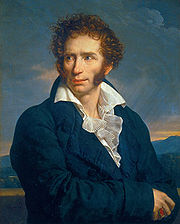
Dei sepolcri
Encyclopedia
Dei sepolcri is a poem written by the Italian
poet
, Ugo Foscolo
in 1806 and published in 1807. It consists of 295
hendecasyllabic verses. The carme
(as the author defined it) is dedicated to another poet, Ippolito Pindemonte
, with whom Foscolo had been discussing the recent Napoleonic law regarding tombs.
Foscolo has materialistic
views about man's destiny after death, but he strongly affirms the value of tombs as memory of noble souls or bright intellects.
Political and Cultural Background
 The idea behind the poem can be traced back to 1804, when the Napoleon edict of Saint-Cloud was issued. On September 5, 1806 the edict was applied to Italy. In short, the edict stated that all burials must take place outside the city walls, that (for democratic reasons) the burial monuments must all be of the same size, and their inscriptions controlled by a special commission. This caused Foscolo to contemplate upon the nature and philosophy of death.
The idea behind the poem can be traced back to 1804, when the Napoleon edict of Saint-Cloud was issued. On September 5, 1806 the edict was applied to Italy. In short, the edict stated that all burials must take place outside the city walls, that (for democratic reasons) the burial monuments must all be of the same size, and their inscriptions controlled by a special commission. This caused Foscolo to contemplate upon the nature and philosophy of death.
Being an atheist, Foscolo did not share the view of e.g fellow poet Ippolito Pindemonte
, who defended the Christian cult as opposed to the new "illuminist" ideas brought on by the French regime. Even so, Foscolo was critical towards the Napoleonic decree regarding tombs, mostly for "civic" reasons: Even though he affirms that there is no life after death, human beings will still aspire to "transcend" death. Tombs, regarded as monument over fallen heroes and virtuous men from the past, may inspire those living today- for instance artists and poets. When marble monuments are destroyed by time, their memories survive in poems they have inspired, and can in turn inspire deep virtues in new generations.
Italy
Italy , officially the Italian Republic languages]] under the European Charter for Regional or Minority Languages. In each of these, Italy's official name is as follows:;;;;;;;;), is a unitary parliamentary republic in South-Central Europe. To the north it borders France, Switzerland, Austria and...
poet
Poet
A poet is a person who writes poetry. A poet's work can be literal, meaning that his work is derived from a specific event, or metaphorical, meaning that his work can take on many meanings and forms. Poets have existed since antiquity, in nearly all languages, and have produced works that vary...
, Ugo Foscolo
Ugo Foscolo
Ugo Foscolo , born Niccolò Foscolo, was an Italian writer, revolutionary and poet.-Biography:Foscolo was born on the Ionian island of Zakynthos...
in 1806 and published in 1807. It consists of 295
295
Year 295 was a common year starting on Tuesday of the Julian calendar. At the time, it was known as the Year of the Consulship of Tuscus and Anullinus...
hendecasyllabic verses. The carme
Carme
Carme may refer to:* Carme * Carme , a moon of Jupiter* Carme , a figure in Greek mythology* Carme group, a group of satellites orbiting Jupiter* Carme, Barcelona, a village in Barcelona province, Spain...
(as the author defined it) is dedicated to another poet, Ippolito Pindemonte
Ippolito Pindemonte
Ippolito Pindemonte was an Italian poet. He was educated at the Collegio di San Carlo in Modena, but otherwise spent most of his life in Verona....
, with whom Foscolo had been discussing the recent Napoleonic law regarding tombs.
Foscolo has materialistic
Materialism
In philosophy, the theory of materialism holds that the only thing that exists is matter; that all things are composed of material and all phenomena are the result of material interactions. In other words, matter is the only substance...
views about man's destiny after death, but he strongly affirms the value of tombs as memory of noble souls or bright intellects.
Political and Cultural Background

Being an atheist, Foscolo did not share the view of e.g fellow poet Ippolito Pindemonte
Ippolito Pindemonte
Ippolito Pindemonte was an Italian poet. He was educated at the Collegio di San Carlo in Modena, but otherwise spent most of his life in Verona....
, who defended the Christian cult as opposed to the new "illuminist" ideas brought on by the French regime. Even so, Foscolo was critical towards the Napoleonic decree regarding tombs, mostly for "civic" reasons: Even though he affirms that there is no life after death, human beings will still aspire to "transcend" death. Tombs, regarded as monument over fallen heroes and virtuous men from the past, may inspire those living today- for instance artists and poets. When marble monuments are destroyed by time, their memories survive in poems they have inspired, and can in turn inspire deep virtues in new generations.

